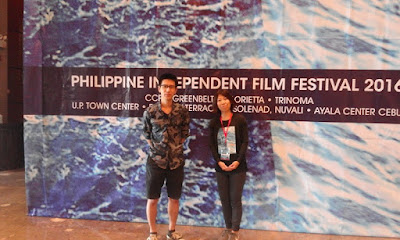 |
| Director Hiroshi Shoji and Line Producer Yumi Honda |
It’s not every day that a
Japanese director is in town with his film about small time drug dealers while
the Philippine government, led by President Rodrigo Duterte, wages an all-out
war against drugs. But that’s exactly the scenario that director Hiroshi Shoji,
along with line producer Yumi Honda, found themselves in as they flew to Manila
to screen the film Ken and Kazu in
this year’s Cinemalaya Philippine
Independent Film Festival.
Prior to the showing of the film, Shoji
and Honda sat down with a few members of the press and talked the film, the
Japanese film industry in general, and a variety of other subjects.
When the relevance of his film in
relation to the Philippines’ current anti-drug campaign was pointed out earlier
on, Shoji stressed that he didn’t really intend Ken and Kazu to be a social commentary tackling the drug problem.
He instead wanted to depict human nature, the struggles and a more universal
theme and message that anyone can relate to.
And Japanese audiences have
responded positively to his film citing the authenticity of the feelings that
touched them and also the commending the film’s technical aspects like the
camera work and also the original screenplay. Aside from directing the film,
Shoji also wrote the screenplay and did the editing.
Honda added that in Japan, an
overwhelming majority of the films produced locally are adapted from novels,
television series and/or manga. But what surprised me was knowing that these locally produced films dominate cinema screens than those that were made abroad like
Hollywood flicks.
We learned that Ken and Kazu is Shoji's first feature length film. It was originally a short feature made back in 2011 and he decided later on to expand it to a full length film. Principal photography for the feature length took two months (of mostly guerilla shoots) while post-production went for around three years. Prior to the Philippines, the film has already been screened at festivals in China, Scotland, and Korea.
We learned that Ken and Kazu is Shoji's first feature length film. It was originally a short feature made back in 2011 and he decided later on to expand it to a full length film. Principal photography for the feature length took two months (of mostly guerilla shoots) while post-production went for around three years. Prior to the Philippines, the film has already been screened at festivals in China, Scotland, and Korea.
Cinemalaya’s opening film 1-2-3 served as both Shoji and Honda’s
first experience with Philippine cinema and I was curious to learn their
impressions about the film and the local audience in general. Both had praises
for the film but Shoji particularly noted that Filipinos were more
demonstrative with their reaction, laughing and cheering loudly inside the
cinema unlike the Japanese who are typically more reserved.
 |
| Shoji and RAd |
Ken and Kazu/ケン と カズ
Titular characters Ken (Shinsuke
Kato) and Kazu (Katsuya Maiguma) are small time drug dealers with each at the
crossroads. Ken wants to leave drugs behind and start anew as he prepares for
fatherhood. Kazu, in his desire to give his mentally ill yet physically abusive
mother the proper care, wants to increase his earnings even if this meant
dealing behind the boss’ back. Now, if only achieving what they want while
mired in the underworld of drugs and the Yakuza is that easy.
What struck me most about the
film was the absolute absence of any police or law enforcement figure in it. (I
asked Honda afterwards about my observation and she responded that this was in
keeping with Shoji’s intent in focusing more on the inner struggles rather than
making a social commentary.)
With the proverbial good guys out
of the picture (and the external threat given to rival drug dealers and pissed
off bosses), the film was able to explore the gray areas within Ken and Kazu’s unpredictable
relationship a lot more. At the start, it was difficult for me to care about
them since the two, who are so unlike each other, acted as if the other didn’t matter
at all. But as the film ended with both Ken and Kazu’s personalities and
motivations fleshed out, I was rooting for both of them hoping that whatever
little good that was left in them would be enough for any sort of redemption.
Ultimately, it’s the human story
in Ken and Kazu that will make me
stop and pause whenever I read a new wave of killings in regards to the war against
drugs. The headlines may feature increasing numbers of those killed, but for
each one that is killed, there is a story behind that life.
Here is the short film version of the film released in 2011.
The screening of Ken and Kazu opened the Visions of Asia section of the Cinemalaya Philippine Independent Film Festival 2016 held at the Cultural Center of the Philippines from August 5-14, 2016. This year, the Cinemalaya has formed an alliance with Eiga Sai: Japanese Film Festival organized by the Japan Foundation, Manila.
Here is the short film version of the film released in 2011.
The screening of Ken and Kazu opened the Visions of Asia section of the Cinemalaya Philippine Independent Film Festival 2016 held at the Cultural Center of the Philippines from August 5-14, 2016. This year, the Cinemalaya has formed an alliance with Eiga Sai: Japanese Film Festival organized by the Japan Foundation, Manila.


No comments:
Post a Comment